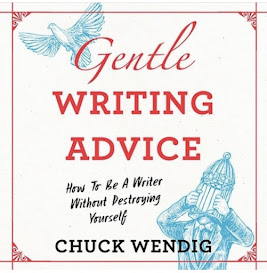On bestselling author Chuck Wendig's book on writing -- Jen Doktorski
Chuck Wendig. Besting selling and award-winning author of many books including Black River Orchard, which releases today, also known for his blog terribleminds.com.
Around our house, he’s known as The Great Uniter.
Cashew vs. almond butter, open windows vs. AC, mountain
hikes vs. beach walks, we have many differing opinions at our house. True, we all
love to read. But not until recently has there been much overlap in the Venn
diagram of our bookish tastes.
But one day, during the many hours of togetherness
during the pandemic (which, by the way, Wendig practically predicted) my husband
suggested a book to our daughter. Wanderers. He handed her the hefty tome
by Wendig and I could tell the challenge of its 780 pages appealed to her. That’s
when the magic happened.
Anyone with teenaged kids knows that sometimes you
have to be satisfied with a passing “Hey” while they’re en route to their
bedrooms in favor of their preferred methods of communication i.e. scrolling
through TikTok and tagging their friends. Group chats. DMs.
So it brought actual tears to my eyes to hear my
husband and daughter saying things like “Did you get to the part where…” and
“What did you think about…” and “Hurry and up and get to Chapter Sixty-Two so
we can talk about....” Conversations! Not texts from behind her closed bedroom
door. Real, honest-to-goodness discussions about this book. Like I said, The
Great Uniter.
The three of us also follow Chuck Wendig on IG. He
takes great pics of bugs, birds, dogs, an occasional fox, and lattes. One day
back in June he posted this.
He teased it with this.
And this.
I was in. I even posted that in the comments. “Sold!
Preordered.” He “liked” it, or whomever curates his page did. But I like to
think it was Chuck.
The timing was perfect, I’d recently split with my
agent of 14 years and had been in a total writing and reading funk as I sat on
the precipice of diving back into the querying trenches. Faced with what I knew
would be lots of one-sided correspondence, I was questioning why it is I do
what I do only to receive disheartening correspondence in the form of royalty statements
that say “No payment is due at this time” or worse, an insulting check for
$23.97.
Adding to this funk was the realization that I’d
earned more for the first magazine article I’d ever sold—to Cosmo, two decades
ago—than I had on my latest YA novel. A novel that took me approximately three
years of my life to write. I would have joined the writer’s strike if I’d had a
job to walk away from.
I needed to know how not to destroy myself!
This book was the answer. It is as informative as it
is hilarious. I laughed out loud reading (spoiler alert) the story he told
about his first real writing job. Sometimes I say I LOLed without really
meaning I LOLed, but in this case both the dog and husband came running to see
what the LOLing was about.
I was laughing too hard to tell them.
One of my college writing professors thought reading craft
books was a waste, that it was time better spent writing. I suppose I could
have said that about his class, or any writing class, but you know, I wasn’t so
bold or as quick with a comeback then. He made an exception for William Zinsser’s
On Writing, which I have to admit, I happen to like very much as well. Probably because I
started out as a journalist and magazine article writer. Anyway, the point is, for
years the opinion of my college mentor colored my own. I kept thinking I should
be writing, not reading books about writing. But then I grew up, got to a point
where I’m writing full-time (only because my spouse is gainfully employed), and
realized he, and in turn I, was wrong.
Some of my best mantras have come from craft books.
Butt in chair. Squeeze out the water words. Scenes are linked by cause and
effect. Conflict is how we learn about our characters. Others, like Save the
Cat and The Plot Whisperer, have helped me with structure. Still others have
provided me with rules.
What I love, love, love about Chuck Wendig’s book is
that it breaks some of those rules. Guess what? I’m using adverbs again. Sparingly,
but using them! Above all else, this book made me laugh. At myself. At the
publishing industry. At the absurdity of the writing process. And because of
that, I felt less alone. That’s huge.
Don't let writing destroy you. Buy the book. Follow him on IG. Sign up for his
newsletter. You won’t be disappointed.



!! Just got ALL of it. Looking forward to all of it.
ReplyDeleteOrdering it now!
ReplyDelete